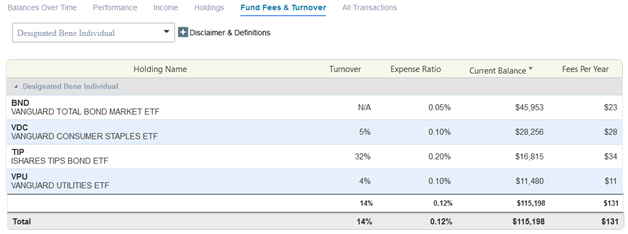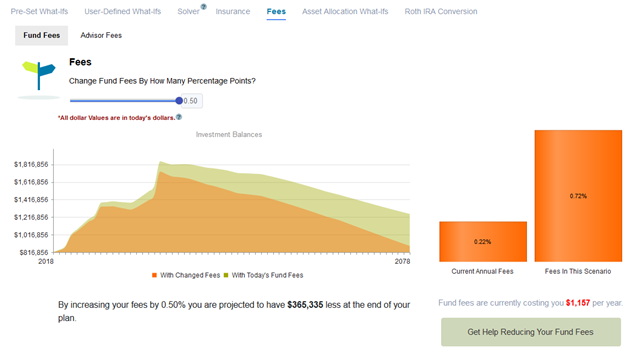Key Points
- 401(k) plan administrative fees and fund fees can take a serious bite out of your retirement.
- Your company has a fiduciary duty to put your interests first with a 401(k) plan.
- You might want to use an IRA rather than your 401(k) after the company match.
Fees can be a killer to a retirement portfolio, and the problems compound over time. Many people investing in the company’s 401(k) plan have no idea what the fees are on the funds they invest in. They also have no idea if they are paying a 401(k) administrative fee.
In a recent study, the National Association of Retirement Plan Participants (NARPP) discovered that nearly 90% of plan participants did not know how to properly calculate their overall account fees. Even worse, over 40% of them had no idea they were paying any fees at all, and over half did not know that fees are automatically deducted from their 401(k) account.
Administrative Fees
Most 401(k) plans have some type of administrative fee. Some are negligible and can be a small dollar amount per year for each participant. But some older plans still have very large administrative fees that aren’t apparent to the participants. Since 2012, companies are required by law to disclose your plan administrative fees. Companies have a fiduciary duty to the employees to make sure that the employees understand the fund choices and the fees they are paying.
If you do not know your plan administrative fees, ask your Human Resources department or whoever is in charge of the 401(k) plan what these fees are. If they seem excessive, it might be time to lobby for a new 401(k) provider.
Investment Fund Fees (Expense Ratios)
Every fund you invest in has an expense associated with it that you pay. This is called the expense ratio of the fund. These expense ratios are easier to find these days with so much information on the internet. You can also use our WealthTrace Retirement Planner to easily view all of your expense ratios for every fund you invest in and manage your wealth.

WealthTrace shows you the fees you pay and turnover of your funds.
How Fees Impact Your Investments
The amount of money that annual fees can cost you over time is astonishing. High fees can literally ruin a retirement plan and force you to work years longer than you otherwise would have to. This is no exaggeration: Just an extra 0.5% in fees can add up to thousands of dollars over time as you can see in our Fee Scenarios below.
 Be your own financial planner. See how increasing or reducing your fees can impact your overall plan in WealthTrace.
Be your own financial planner. See how increasing or reducing your fees can impact your overall plan in WealthTrace.
Many 401(k) plans have actively managed funds that charge over 1% annually while a passive index fund from Vanguard might only have an expense ratio of 0.1% or less.
It is wise to look at how much you are paying for each fund. If the expense ratio is more than 0.5%, see if there are other similar funds out there from Vanguard. If there are, show this to the person in charge of your 401(k) plan and ask them to press the 401(k) provider to add lower cost index funds. If the provider refuses, it is likely time to find a provider that offers lower cost index funds like Vanguard does.
Target Date Funds
Thankfully many 401(k) plans now offer target date funds to their employees. These funds not only have lower expense ratios than most other funds available in 401(k) plans, but they also choose the appropriate risk level for you automatically based on your retirement date. Even better, they automatically rebalance for you as you get older, making sure that you take on less and less risk as you approach your retirement date.
Another positive for target date funds is that they are usually well diversified among U.S. stocks, U.S. bonds, international and emerging market stocks, and even international bonds.
Using An IRA
One of the best things about a 401(k) plan is the company match. This is free money to employees and everybody should contribute to their plan at least up until the company match disappears. After the match stops, it might be wise to start investing in an IRA instead.
Even if you invest in a 401(k) plan, you can also invest in an IRA. However, the amount you can invest each year depends on your income. But it might be worth having an IRA on the side because the IRA will allow you to invest in any fund you want, which means more choice and lower fees. It also means you can use a Roth IRA or choose to convert to a Roth IRA at a future date.
Roll Over Your 401(k) As Soon As You Retire
The moment you retire you should roll over your 401(k) plan into an IRA. The main reason is that the fund fees in a 401(k) plan will be higher than in your IRA 99.9% of the time. You will also have no administrative fee in your IRA. Lastly, you will have access to every mutual fund, ETF, and individual stock on the market in your IRA. These are choices you do not have in your 401(k) plan.